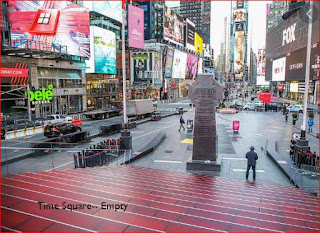I’ve Seen the End of The World a Few Times and I’m Here to Talk About it.
Philip Maher
Are you tired of seeing a plethora of stories
related to the toilet paper Apocalypse? I sure am. But here we are. This virus
seemed to have popped up in our vocabulary just a few weeks ago, yet it is all
that we can think about today.
Those of us from
the international aid universe have seen Armageddon and it’s not that bad. Of
course, it’s horrible if you’ve lost a loved one. Your life is changed and for that
I’m sorry. But, read on.
Take
solace that this is not the actual end of the world. Better days are ahead—just
hang on. Yes, it’ll be a wild ride. But most of us will make it through.
Having worked
around organizations like World Vision, The World Food Program and a variety
of military folks in the midst of crises, I’ve seen the Apocalypse a few times
over my 30-year career. I try to see it all in perspective.
 The empty streets
of Toronto, Vancouver or New York remind me of entering a number of almost
empty cities during evacuations and lockdowns.
The empty streets
of Toronto, Vancouver or New York remind me of entering a number of almost
empty cities during evacuations and lockdowns.
My first was a nearly vacant city in Angola during a war and the famine that followed. All that remained was a few hungry locals who were too poor to leave. A few years later I was driven through the radioactive city of Pripyat, near Chernobyl. A few years after that I arrived at the deserted capital of Kigali after the genocide. Void of humans, all these places seemed to feel like the end of the world.
 |
| My visit to an empty city in Angola |
Unoccupied cities are
nothing new to me, nor overall craziness from chaos and feeling vulnerable. In East Timor during a civil conflict that
destroyed that country we pitched tents in burned-out buildings and hoped we’d
make it through the night. Somalia’s war, Sudan’s conflict, the tsunami, Bosnia
and Syria—I’ve seen the end a dozen times.
I know some
readers will argue, “Yes but these were different situations.” Yes, but they
always are. One thing I learned in this
business is that disasters are never the same. Shift happens. Crises always
come with some new twist. That’s why they are crises.
The most poignant
words come from people who have escaped these horrors. A woman from Rwanda,
after the genocide, said to me, “We thought it was the end of the world.” For
some, it was. I asked a mother in Bosnia about mourning her son’s death. She
said, “Philip, mourning is a luxury.”
I don’t mean to trivialize
horror. But most of these scenarios are much more violent than anything we are
seeing today, except perhaps in the toilet paper aisle.
I am taking this pandemic
seriously. I’ve also seen the results of not obeying health officials with the
spread of Ebola in West Africa. So, I’m complying with all that health officials are asking of us. However, we’ve seen disasters
before. For most people, crisis is just a word. For me, it’s been a regular
occurrence over my career. But, we are not on a roller coaster going downhill, with
our hair on fire with no track at the end.
The good news is
that it seems likely that we will have a medical solution to this. No, it will not come fast enough. It never does. But anti-viral vaccines are already being
tested. Furthermore, most cases are mild, we know how to detect it and we know
how to kill it on surfaces.
C.S. Lewis asked, “How are we to live in the atomic age?” His answer, “Do not let us begin by
exaggerating the novelty of our situation.”
My final note:
keep those toilet paper memes and jokes rolling in. They help to keep me afloat
like an emotional life jacket. Wash your hands and stay home.
Stay healthy….
Philip.
Kindly said. Great perspective. Thanks, friend!
ReplyDelete